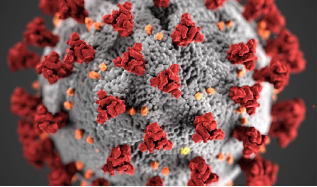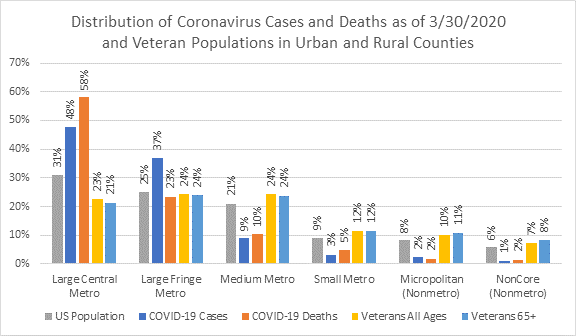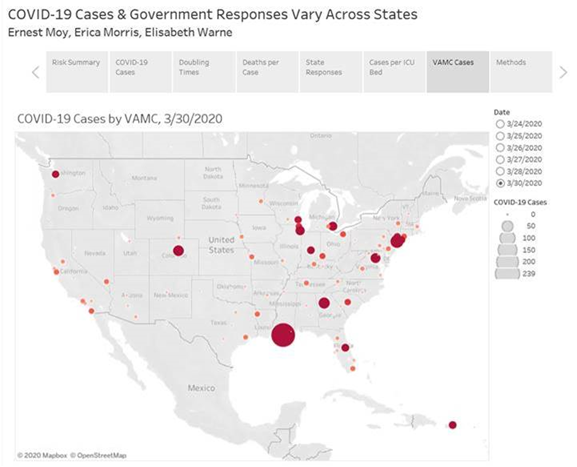Coronavirus Disease 2019 (COVID-19)
Coronavirus in Rural and Urban Areas: Implications for Veterans
|
 |
SUMMARY
Analyses of data compiled by the Johns Hopkins CSSE 2019 Novel Coronavirus COVID-19 Data Repository suggest that rural Veterans may be able to better prepare for the arrival of COVID-19 in their communities compared to the general U.S. population
INTRODUCTION
The Veterans Health Administration (VHA) serves a Veteran population that is increasingly racially and ethnically diverse. Equitable access to high-quality care for all Veterans is a major tenet of the VA healthcare mission. The Office of Health Equity (OHE) champions the elimination of health disparities, including addressing social determinants of health, such as employment status, to achieve health equity for all Veterans.
Coronavirus disease 2019 (COVID-19) is a respiratory illness that can spread from person to person. Risk of infection with COVID-19 is higher for people who are close contacts of someone known to have COVID-19, for example healthcare workers, or household members.
WHERE VETERANS LIVE AND CORONAVIRUS DISEASE
Analyses of data on cases and deaths compiled by the Johns Hopkins CSSE 2019 Novel Coronavirus COVID-19 Data Repository indicate that most of the COVID-19 cases in the United States have been in inner city (large central metropolitan) and suburban area (large fringe metropolitan) counties. Additionally, a disproportionate share of COVID-19 deaths have been reported by inner city counties.
However, compared with the overall US population, Veterans are more likely to reside in less populated areas - Medium Metropolitan, Small Metropolitan, Micropolitan (small town), and NonCore (most rural) counties. These less populated areas have reported fewer numbers of COVID-19 cases and deaths. These lower numbers may reflect a combination of lower population densities and more limited access to COVID-19 testing. Therefore, rural Veterans may be able to better prepare for the arrival of COVID-19 in their communities.

Sources: Johns Hopkins CSSE 2019 Novel Coronavirus COVID-19 Data Repository as of 3/30/2020, CDC Wonder, National Center for Veterans Analysis and Statistics Veteran Population Estimates.
VA'S CORONAVIRUS RESPONSE
VA has implemented an aggressive public health response to protect and care for Veterans, their families, health care providers, and staff in the face of this emerging health risk. We are working directly with the CDC and other federal partners to monitor the outbreak of the virus. VA has administered over 13,216 COVID-19 tests nationwide. As of March 30, 2019, VA has had 1,166 positive Veteran cases.
To access an interactive version of the above data visualization, go to: https://public.tableau.com/views/covidState6/Story1?:display_count=y&publish=yes&:origin=viz_share_link
Any Veteran with symptoms such as fever, cough or shortness of breath should immediately contact their local VA facility. VA urges Veterans to call before visiting – you can find contact information for your closest VA facility. Alternatively, Veterans can sign into My HealtheVet to send a secure message to VA or use telehealth options to explain their condition and receive a prompt diagnosis. To learn more about what Veterans should do to protect themselves or if they are sick, go to https://www.publichealth.va.gov/n-coronavirus/.
For more information about the Office of Health Equity visit: https://www.va.gov/healthequity/
For additional OHE information briefs and fact sheets visit: https://www.va.gov/HEALTHEQUITY/Publications_and_Research.asp
REFERENCES
Centers for Disease Control and Prevention. “What you need to know about coronavirus disease 2019 (COVID-19) Sheet.” https://www.cdc.gov/coronavirus/2019-ncov/downloads/2019-ncov-factsheet.pdf.



















